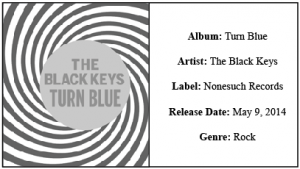“Can I cry? I don’t like! You changed your sound, man! WTF happened?”
That comment, more or less verbatim, was one of the world’s first reactions to “Turn Blue.” Well, a fraction of it, anyway: it was posted mere minutes after the initial upload of controversial, disco-tinged lead single “Fever.” And the funny thing is, it’s not entirely wrong.
“Fever,” like the rest of “Turn Blue,” constitutes something of a departure from the classic Black Keys playbook. Gone are the nonexistent production values, the primitive/brilliant instrumentation and the lower-than-lo-fi recording quality.
Replacing them are sampled Italian film scores, reverb-heavy backing vocals and even (gasp!) synthesizers. It’s a direction they’ve been moving toward for a while, but there’s something about “Turn Blue” that feels like they’ve finally summoned the courage to go all-in on the sound.
Despite the title, this is easily the least blues-based album Dan Auerbach and Pat Carney have ever recorded.
And, yet, they make it work. The Keys manage a neat trick on “Turn Blue”: they’ve jettisoned almost everything that once defined them, but it’s still resulted in something that is unmistakably a Black Keys album. It may not sound as raw as the band’s pre-”Brothers” output did, but “Turn Blue” is still a valuable addition to one of the most well-known discographies in 21st-century rock.
That’s largely thanks to super-producer Danger Mouse, who’s been working with the band since 2008’s “Attack and Release.” His contributions felt slightly awkward on that album, as if producer and band hadn’t worked out a good balance yet, but he’s practically become the third Black Key ever since. With that in mind, it’s hard to imagine “Turn Blue” without his input — though some purists might want to.
Over the years, Danger Mouse has developed a distinctive approach to making music, one defined primarily by…sampled Italian film scores, reverb-heavy backing vocals, and synthesizers. And “Turn Blue” is an incredibly Danger Mouse-y album. Unless you’re still holding out hope for the days of “Thickfreakness” to return, that’s a good thing.
“Turn Blue”’s opening epic, “Weight of Love,” serves as a very convincing argument in favor of Danger Mouse’s continued involvement with the band. Clocking in at almost seven minutes (a career record for the band), “Weight of Love” spends two minutes before so much as introducing Auerbach’s voice. Even then, the verses are short and spaced-out, the distance between filled by ambient synths, soft, bell-like tones and absolutely massive guitar solos. It may be more than a little reminiscent of “Speak to Me/Breathe,” but that doesn’t stop the track from being “Turn Blue’”s clearest standout.
Putting a song as monolithic as “Weight of Love” as the opening track of an album is a risky move, as it invites the possibility of the other tracks not living up to that early promise.
Fortunately, that’s not the case here — the remainder of “Turn Blue” more than holds its own. The title track and “Waiting on Words” are gorgeous ballads from a band that always seemed more interested in straight-up rock songs. “In Time” directly recalls Auerbach’s recent production work on New Orleans legend Dr. John’s album “Locked Down.” And “10 Lovers” is somehow even more disco-y than “Fever,” but it’s also one of the catchiest Black Keys songs ever, so it’s hard to get too upset.
Put all of that aside, however, and one question remains: can we cry? The answer: yes, but not because we don’t like. Instead, we can cry because the final solo in “Weight of Love” is just that good, and because the lyrics were apparently inspired by Auerbach’s recent divorce, and…well, because we might be waiting another two and a half years for the next Black Keys album.
If they can deliver another record on this level, however, it’ll be worth holding out for. “Turn Blue” may not be a spiritual sequel to “Rubber Factory,” “The Big Come Up” or even “El Camino,” but it does something even better: it fills a void in the band’s catalog that didn’t even seem to be there before.
“You changed your sound,” indeed.
























